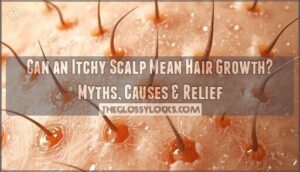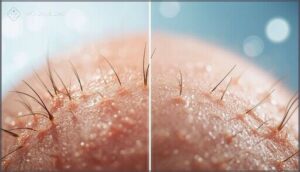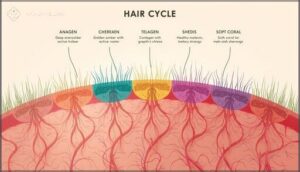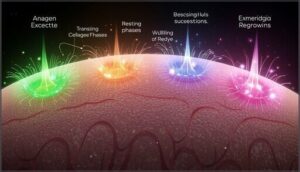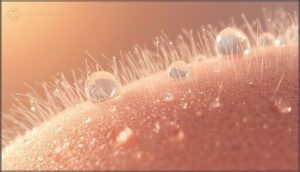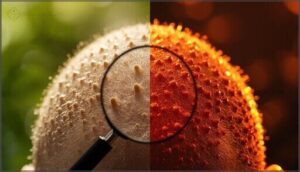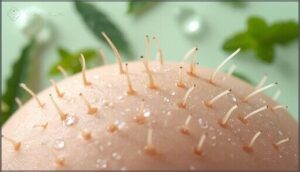This site is supported by our readers. We may earn a commission, at no cost to you, if you purchase through links.
That tingling sensation across your scalp might not be the warning sign you think it is. While most people assume an itchy scalp points to dandruff or dryness, it can actually signal something far more welcome: new hair growth.
The catch? Not every itch means your follicles are busy sprouting fresh strands. Your scalp houses hundreds of thousands of hair follicles, each cycling through distinct growth phases that create subtle sensations you might mistake for irritation.
But here’s where it gets tricky—scalp itchiness stems from dozens of causes, from harsh shampoos stripping away protective oils to underlying skin conditions demanding medical attention. Learning to read what your scalp is telling you separates genuine regrowth from red flags that need a dermatologist’s eye.
Table Of Contents
- Key Takeaways
- Can an Itchy Scalp Indicate Hair Growth?
- What Causes an Itchy Scalp?
- How Does The Hair Growth Cycle Affect The Scalp?
- How to Identify Itchiness From Hair Growth Vs. Other Issues
- Managing Itchy Scalp During Hair Growth
- Frequently Asked Questions (FAQs)
- How to know if hair is growing on the scalp?
- Does an itchy scalp mean hair loss?
- Are there any natural remedies for itchy scalp and hair loss?
- How do I know if my hair loss is caused by a medical condition?
- Are there any exercises I can do to help my hair growth?
- What vitamins and minerals should I take to promote hair growth?
- Does stress affect scalp itchiness and hair growth?
- Can hormonal changes trigger itchy scalp symptoms?
- Is itchy scalp more common during certain seasons?
- Do vitamins or supplements reduce scalp itchiness?
- Conclusion
Key Takeaways
- An itchy scalp doesn’t actually indicate hair growth—persistent itchiness usually signals dryness, product irritation, dandruff, or underlying scalp conditions rather than new follicle activity.
- While new hair growth can cause brief tingling or mild prickling as follicles activate, these sensations are temporary and shouldn’t be confused with the chronic itch caused by skin problems or harsh hair care products.
- Warning signs like persistent itch lasting over six weeks, fever, oozing patches, or hair loss combined with thickened skin require immediate dermatologist evaluation to rule out infections or serious scalp disorders.
- Managing scalp itchiness effectively means using gentle cleansers, scalp massage with soothing oils like tea tree or peppermint, medicated shampoos with zinc pyrithione or ketoconazole for dandruff, and avoiding scratching that damages follicles and skin.
Can an Itchy Scalp Indicate Hair Growth?
You’ve probably heard someone say that an itchy scalp means your hair is growing. It’s one of those beauty myths that gets passed around like truth, but the science tells a different story.
The truth is, itchy scalp and hair growth aren’t actually connected—that itch usually signals irritation, dryness, or a scalp condition instead.
Let’s separate what’s real from what’s wishful thinking, then look at how new hair growth actually affects what you feel on your scalp.
Common Myths Vs. Scientific Evidence
Why does everyone assume an itchy scalp means hair growth? That’s a myth busting moment: hair growth usually doesn’t cause long-lasting scalp itchiness.
Scientific facts show that new follicles may briefly tingle as they resume activity, but most itch signals stem from dryness or product irritation, not deeper hair follicles. Evidence-based research confirms that scalp health issues, not growth itself, drive persistent scalp itchiness.
Most scalp itching comes from dryness or product irritation, not hair growth—follicles may tingle briefly, but persistent itch signals deeper skin issues
How New Hair Growth Can Affect Scalp Sensations
So what sensations does real hair regrowth trigger? You might notice mild tingling as new follicles activate—baby hairs feel softer and lighter when they first emerge.
Hair follicles pushing through your scalp can create a prickly sensation, especially near the hairline or crown. Blood flow changes during regrowth phases may cause temporary warmth, while short, emerging strands can irritate surrounding skin, producing light itch triggers that fade as your hair lengthens.
You can learn more about signs of new hair growth from medical experts in the field.
What Causes an Itchy Scalp?
An itchy scalp doesn’t always mean your hair is growing—it’s usually your skin telling you something’s off.
The causes range from simple dryness to more complex scalp conditions that need attention. Let’s look at what’s really behind that persistent itch.
Dryness, Dandruff, and Scalp Conditions
Your scalp can feel dry and itchy when winter months or harsh shampoos strip away natural oils, triggering dryness and white flakes that shed easily.
Dandruff, often caused by Malassezia fungus overgrowth, produces oily or dry flakes with persistent itchiness. Scalp conditions like seborrheic dermatitis create greasy, yellowish scales, while psoriasis forms thick, silvery patches.
These issues require targeted dandruff treatment, scalp moisturizing, or medicated shampoos for itch relief and flake removal. For more details about common dry scalp symptoms and causes, explore additional prevention and treatment options.
Hair Care Habits and Product Reactions
Sometimes what you put on your scalp triggers more itch than any strand poking through. Sulfate-heavy shampoos strip protective oils, while silicone-loaded conditioners create buildup that clogs pores.
Switching to gentler formulas can help restore balance, especially if you’ve noticed changes in how your hair grows at different rates across your body.
Product allergies to fragrances or preservatives can spark contact dermatitis, turning gentle shampooing into irritation. For scalp health and hair growth, patch-test new formulas, try scalp exfoliation weekly, and swap harsh products for gentler options featuring niacinamide or hair oils.
Ingrown Hairs and Follicular Irritation
Curly or coarse hair texture can trigger ingrown hairs when strands curl back into the skin after shaving or waxing, sparking follicular irritation and an itchy scalp. Dull razors and tight clothing worsen skin irritation, while poor follicle health invites inflammation.
- Sharp, clean blades minimize ingrown prevention issues
- Regular scalp exfoliation clears trapped hairs
- Moisturizing maintains elasticity
- Warm compresses soothe scalp inflammation
Scalp Infections and Underlying Skin Disorders
Persistent itch sometimes signals fungal infections, bacterial folliculitis, or seborrheic dermatitis rather than healthy hair growth. These dermatological conditions trigger scalp inflammation through microbes like Staphylococcus or Malassezia, requiring medicated shampoos or antibiotics. Scalp eczema and skin irritation from psoriasis also cause itchiness and shedding.
| Condition | Key Signs | Typical Treatment |
|---|---|---|
| Tinea capitis | Patchy loss, scaling | Oral antifungals |
| Bacterial folliculitis | Red bumps, pus | Antibiotic creams |
| Seborrheic dermatitis | Greasy flakes, redness | Ketoconazole shampoo |
| Scalp eczema | Dry patches, crusting | Topical steroids |
| Psoriasis plaques | Silvery scales beyond hairline | Coal tar treatments |
Early dermatologist evaluation prevents worsening scalp disorders and protects your follicles from lasting damage.
How Does The Hair Growth Cycle Affect The Scalp?
Your scalp isn’t just sitting there waiting for hair to appear—it’s actively cycling through distinct growth phases that affect how your skin feels. Each phase triggers different biological changes beneath the surface, and some of those shifts can create sensations you might notice.
Understanding these growth phases helps you recognize what’s normal growth activity versus a sign that something’s actually wrong.
Overview of Hair Growth Phases (Anagen, Catagen, Telogen, Exogen)
Your hair follicles move through four distinct growth cycles: anagen, catagen, telogen, and exogen. During anagen—the active phase lasting two to six years—about 85 to 90 percent of your follicles are busy producing hair.
Catagen is a brief two-to-three-week shift, while telogen marks a three-to-four-month rest period. Exogen is when old hairs finally shed, making room for hair regrowth.
Sensations Linked to Each Growth Phase
Each phase of the hair growth cycle brings its own set of sensations. During the anagen phase, you might feel mild tingling or tightness as follicles actively produce new strands.
Catagen symptoms can include brief itchy flares or pressure as follicles shrink. Telogen signs often involve an itchy scalp preparing for shedding, while exogen feelings may bring temporary tingling.
Regrowth sensations usually include soft prickling as new hair emerges.
Signs of New Hair Emerging on The Scalp
When follicle activation kicks in, you’ll notice telltale signs that hair regrowth patterns are underway. These regrowth symptoms often appear subtly at first.
Watch for these key indicators of hair regeneration:
- Fine peach fuzz along your hairline—translucent strands under 2mm that feel velvety
- Increased scalp sensitivity with mild tingling as new hair texture emerges
- Short, soft fibers standing slightly upright where thinning existed
These changes confirm your hair follicles are rebuilding strength for better scalp health.
How to Identify Itchiness From Hair Growth Vs. Other Issues
Not all scalp itchiness means your hair is growing back. Sometimes it’s a sign that something else is going on—something that needs attention.
Here’s how to tell the difference between normal regrowth sensations and warning signs that warrant a closer look.
Visual and Sensory Indicators of New Hair
When you run your fingers across your scalp, you might notice subtle changes that signal new growth. Peach fuzz along your hairline, tingling sensations during follicle stimulation, or slight texture shifts all point toward active hair regeneration. These visual and sensory signs tell you that your hair follicles are waking up, improving scalp health, and producing genuine new growth—not just wishful thinking.
| Visual Indicator | What You’ll Notice | What It Means |
|---|---|---|
| Peach Fuzz | Fine, velvety hairs along hairline | Follicles entering active growth phase |
| Hair Texture Changes | Softer, silkier feel to new strands | Healthy cuticle formation and nourishment |
| Scalp Tingling | Mild, temporary sensation in growth areas | Increased blood flow supporting follicle stimulation |
| Density Improvements | Fuller appearance, less visible scalp | Multiple hairs entering anagen simultaneously |
| Strand Thickness | Gradual widening of hair shaft | Strengthening follicles producing strong fibers |
These new growth signs usually appear within six to twelve weeks of improved scalp health routines.
When Itchiness Signals a Medical Concern
Those subtle sensations can hint at real growth, but some itchiness demands urgent attention. Chronic pruritus lasting more than six weeks isn’t normal—it can signal scalp infections, skin lesions, or dermatological disorders hiding beneath the surface.
If you notice fever symptoms, rapid weight loss, or thickened patches with hair loss, don’t wait. Medical evaluation protects your scalp health before minor irritation turns into a serious skin and scalp condition.
| Warning Sign | What It Looks Like | Your Next Step |
|---|---|---|
| Persistent Itch + Fever | Itching that won’t quit, body feels warm | See a clinician within 48 hours |
| Oozing or Crusting Patches | Wet, sticky spots or hard scabs | Schedule dermatologist evaluation soon |
| Hair Loss + Thickened Skin | Bald areas with rough, raised texture | Test for psoriasis or scalp disorders |
Managing Itchy Scalp During Hair Growth
If your scalp is itching during hair growth, you don’t have to just tough it out.
There are practical ways to calm the discomfort without disrupting the growth process or damaging your follicles. Here’s what actually works to keep your scalp healthy while new hair comes in.
Scalp Care Tips for Itch Relief
Itch relief starts with the basics: keep your scalp hydrated using lukewarm water and gentle products that won’t strip natural oils. A light scalp massage with hair oils can soothe irritation and boost circulation without causing harm.
Regular scalp exfoliation removes buildup that triggers itchiness, while cool compresses calm flare-ups fast. Managing scalp itchiness means working with your skin, not against it.
Recommended Products and Ingredients
You’ll want medicated shampoos with zinc pyrithione or ketoconazole to tackle dandruff-driven scalp itchiness, while soothing oils like tea tree or peppermint calm irritation and support the hair regeneration process.
Hydrating serums with hyaluronic acid lock in moisture without weighing hair down, and barrier repair ingredients—aloe, niacinamide, shea butter—restore your scalp’s natural defenses. Pair these hair care products with gentle conditioners that nourish without clogging follicles during hair growth.
Preventing Damage From Scratching
Once you’ve picked the right products, protecting your scalp from scratching becomes your next mission. Keep nails trimmed short and smooth—nail care matters because jagged edges snag hair shafts and gouge skin.
Try gentle massage with your fingertips instead of digging in, or press a cool compress on itchy patches to calm nerve endings. These cooling techniques interrupt the itch signal without wrecking scalp health or slowing hair growth.
When to Consult a Dermatologist
Sometimes itchy scalp irritation doesn’t fade, and that’s when dermatology expertise becomes essential. If you notice these emergency symptoms, book a dermatologist referral:
- Severe redness, pus, or warmth—skin infections need rapid scalp conditions and treatment
- Sudden bald patches or rapid hair loss beyond normal shedding
- Pain, bleeding, or swelling that disrupts daily life
- Persistent itch lasting weeks despite scalp health strategies
Urgent care matters when scalp conditions worsen.
Frequently Asked Questions (FAQs)
How to know if hair is growing on the scalp?
Look for short baby hairs along your hairline, tiny dark dots near follicles, and soft peach fuzz in previously thin areas—scalp examination reveals these new hair signs tracking your hair growth cycle and regeneration process.
Does an itchy scalp mean hair loss?
Itchy Scalp doesn’t automatically mean Hair Loss. Most often, it signals Scalp Health issues like dryness or dandruff, not Follicle Damage.
Persistent itch with shedding, though, can hint at conditions affecting Hair Growth Patterns.
Are there any natural remedies for itchy scalp and hair loss?
Gentle cleansers, tea tree oil, and aloe vera soothe irritation.
Coconut oil massage promotes scalp health, while omega-rich foods reduce inflammation. These natural remedies ease itchy scalp symptoms and create conditions that foster hair regeneration.
How do I know if my hair loss is caused by a medical condition?
Medical hair loss often appears as sudden shedding, patchy bald spots, or scalp symptoms like burning and tenderness.
If you notice these patterns alongside fatigue or unexplained weight changes, consult a dermatologist promptly.
Are there any exercises I can do to help my hair growth?
You can’t exercise a follicle into sprouting faster, but scalp massage, hair yoga poses, aerobic exercise, and resistance training boost blood flow stimulation—supporting scalp health and the hair regeneration process overall.
What vitamins and minerals should I take to promote hair growth?
Your follicles thrive on B vitamins like Biotin and B12, plus iron, zinc, and Vitamin D.
Omega-3 fats support scalp health, while balanced protein intake fuels hair growth. Target mineral deficiency through whole foods first.
Does stress affect scalp itchiness and hair growth?
When your mind races, your scalp often follows—stress triggers oil surges and heightened scalp sensitivity, worsening itchiness while disrupting hair regrowth cycles.
Managing stress through relaxation promotes steadier hair growth and calms persistent scalp itchiness.
Can hormonal changes trigger itchy scalp symptoms?
Yes, hormonal changes can definitely trigger itchy scalp symptoms. Estrogen decline, androgen shifts, and hormone fluctuations alter oil production, dry your scalp, increase sensitivity, and sometimes worsen dandruff—all fueling scalp irritation and itchiness.
Is itchy scalp more common during certain seasons?
As the saying goes, “change is the only constant”—and your scalp feels it.
Winter dryness, humidity shifts, and climate influences trigger seasonal itch patterns, worsening dandruff, dry scalp, and scalp irritation when temperatures drop.
Do vitamins or supplements reduce scalp itchiness?
Certain vitamins can help when deficiencies drive your itch. Vitamin D, omega-3s, zinc, and B vitamins support scalp health and reduce inflammation.
Probiotics may balance your scalp’s microbiome, easing chronic irritation for some people.
Conclusion
Your scalp doesn’t send telegrams announcing new growth, but those subtle tingles sometimes carry real news. While can an itchy scalp mean hair growth remains true in specific cases, most itchiness points elsewhere—product reactions, dryness, or conditions needing attention.
Trust what you see alongside what you feel: emerging stubble, follicle activity, and context matter more than sensation alone. When doubt creeps in or discomfort persists, your dermatologist reads scalp signals better than guesswork ever will.

